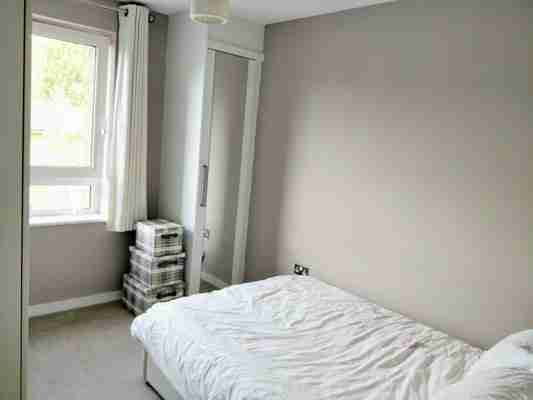What if I told you that you can live in the UK 20% cheaper? That’s what I found when I discovered the shared ownership scheme. Shared Ownership is a government-backed scheme where you can buy part of your home while renting the rest from the developer.
You have to be a first-time buyer to be eligible or not own a home. It’s not the same as “Help to Buy” and first, I want to take a moment and highlight how awesome Shared Ownership is.
I think of it as the best Renting Lifehack.

I will describe my experience after having viewed some properties online and asked agents and housing associations many questions to understand how it works.
Although you may recall I decided to pass on buying a London property 2 years ago, I’m inherently interested in the property market, hence this post.
What is Shared Ownership?
In a very brief description, Shared Ownership gives people the option to buy part of a property while paying rent on the remaining part to the housing association.
The rent that you pay is lower than the equivalent market rent which makes shared ownership a more affordable deal. Over time, you can buy more of your property at the future price, a process also known as staircasing.
Eligibility criteria:
- Not own a home (Be a first-time buyer or sell the one you own)
- Household gross annual income up to £80,000 in the UK or £90,000 in London
- Show that you can afford the (lower) deposit and ongoing costs
What’s the point of buying AND renting I hear you say? I had the same question. Before you completely discard the idea let’s have a look at a real-world example as well as the pros and cons.
A real-world example – Shared Ownership 25%
Here’s a Shared ownership flat selling for £485,000 near my neighbourhood in Southeast London. It’s a 2-bed, first floor flat and our share can be as low as 25%. That’s £121,250.
- 25% of full price: £121,250
- Deposit required: £12,125
- Mortgage repayments on 25%: £474
- Rent payment on 75%: £790
- Service charge: £169
Assuming 2.2% mortgage rate and 2.6% rent rate
Total monthly cost: £1,433
This flat would normally rent for about £1,800 as it’s a new built in a modern development in Zone 2. That’s a £4,404 difference a year compared to traditional renting, excluding of course the costs that go with owning your home such as broken boilers, the need to buy new furniture etc.
It’s worth noting though that shared ownership flats are usually new developments or resales of new builds so you should expect lower maintenance costs.
Also some of our money would go towards repaying the 25% so that’s there as well.
How much would it cost had we bought the entire flat as usual?
Assuming the same 10% deposit, we would now need £48,500 deposit. On the same mortgage terms (2.2%, 25 years), according to the Rightmove calculator, that brings us to a total monthly cost of £1,893. A £5,520 per year difference compared to Shared Ownership.
I can already hear readers screaming at me: “But you’re left with your own home in the end, not a measly 25% of it!”.
I know, I know… Let me explain. So we have the following calculations:
- 100% mortgage: £1,893 per month
- 25% mortgage, 75% rent: £1,433 per month
- 100% rent: £1,800 per month
Personally, the value I see in purchasing a Shared Ownership property is that my ongoing costs are much lower compared to all other options. Simply put, IT’S THE CHEAPEST WAY TO RENT!!!
I say rent because I consider it more like a Renting Lifehack rather than owning a home. You offer a £10,000 deposit in exchange for a cheap rent for life. Now, you may go for the 75% and pay close to the mortgage rates but in that case, why not go full 100% and own it outright?
By the way, if you keep buying a higher share of your home (this sounds weird) you will eventually own it 100% and can do whatever you want with it.
Obviously, there are advantages and disadvantages with this scheme. I’ll try to list most of them here.
Shared Ownership Pros
1. Live on reduced costs
As strange as it may sound, a shared ownership flat will cost you less each month compared to a traditional property.
This makes sense if you think there are salary levels above which you are not eligible. Your household take-home income must be below £80,000 or £90,000 if you’re buying in London. The government is trying to help people buy their first home and to make it more affordable than the current ridiculous prices of 14x the average wage……
As we saw in our real-world example the same home would cost £367 per month more had you rented it out or £460 more had you bought it via the traditional mortgage route.
If you ask me, I want to live somewhere and pay cheaper than the average house. Isn’t this what value investors do when they purchase stocks only when they’re selling below their fair market value? Ok, you can call me a value occupant then :)
2. Pay a much lower deposit than usual
2.5% deposit to be exact :)
Normally, you’d need at least a 10% deposit for your first home. That is a £50,000 for a £500,000 property. Now if you’re buying only 25% of it, we’re talking about a £12,500 deposit – a much more affordable arrangement!
Of course, you’re only paying the deposit towards the share of your home (25% = £125,000), hence the low deposit.
That is a great step if you don’t have enough money for a 10% deposit or if you want to put this money towards a better use. Maybe you don’t want to put £50,000 down towards your home and want to invest it in your business instead. You have the option to do that, and I love having options in life.
Having enough money stashed away for rainy days should go without saying here. Similar to how normal buying works, “Your home may be repossessed if you stop paying…”.
3. You reduce your property market risk

This is a subtle way of sharing a property downfall risk with someone else. Effectively, what shared ownership allows you to do is to limit your losses in a property slump.
Let’s say you want to sell your house but the property market falls by 20% since you bought it. You bought it for £500,000 and had placed a £50,000 deposit.
The new selling price is now £400,000. Had you bought it via the traditional mortgage route, you would be now sitting at a £100,000 loss. But through shared ownership, you only lost £25,000 (20% of your share). The rest of the losses belong to the developer.
Of course, it works both ways, you limit your gains when the price increases (see cons below).
I think about this argument more and more given that the London property market is currently not on sale.
Shared Ownership Cons
1. You limit your upside when your home appreciates
Because you only own part of your home and pay rent on the rest, you’re not benefiting from the whole house appreciation.
Isn’t the purpose of a house to brag at dinner parties on how much it has appreciated in the past X years? :)
Jokes aside, you buy a house to live in, but you also benefit from the price increase if you sell later on. If you put 25% down towards a traditional mortgage, you benefit 4x more compared to owning 25% on shared ownership.
Owning a percentage of your home through Shared Ownership will only return the house appreciation on your part, not the renting part.
2. Your home doesn’t feel yours
It really depends how you see it. Personally, I don’t really care and cannot speak much about it since I do not own any home, but I know most people do care.
3. You don’t choose the sell price
A RICS valuation has to take place that will determine the selling price of your property. You cannot say, “you know what, I think it can sell for more” or “I’m in a hurry, I’m happy to accept below market value”. You must accept the fair value the valuation will come up with.
I find that fair, otherwise you will have to enter into negotiations with the developer about the market price and then the developer may not be happy with your price. Therefore, despite making people uncomfortable, I believe this is a fair way to do it.
Also, because you can only sell to first-time buyers interested in shared ownership, selling your house is a bit harder. It gets even harder the higher percentage you own because your buyer will have to buy at least your minimum share and not lower.
The process goes like this: The housing association will try to find a seller for you through their selling program. They will post it on different websites, including the awesome aggregator: ShareToBuy.
If the property doesn’t sell, they will outsource the selling to estate agencies or yourself who can then market the properties to first-time buyers.
4. Making an offer is not straightforward
Normally, you don’t even need a mortgage “agreement in principle” in order to make an offer for a property. But in the Shared Ownership world it’s a different story.

To apply for a property, you need to register on the developer’s website and make an application to obtain a reference number. Depending on the developer you may need to submit many details. For example, you’ll need to declare your income, credit card loans, savings, full address history etc for both you and your partner.
If you meet the criteria (first-time buyer, income threshold, not in arrears) you’re then approved and can apply for the property! It is an extra hassle but makes each application more serious I guess. Takes “gazumping”, “gazundering” and those stupid tricks out of the game.
5. You cannot rent it out
Nope, you can’t. Only in exceptional circumstances and you’ll have to agree with the developer first. If you staircase to 100% then you own your home and can do whatever you want with it.
This is another reason I consider Shared Ownership more like affordable renting rather than owning.
Final Thoughts
Is Shared Ownership for you? I don’t know but I think there is certainly value in it for people that don’t have a high deposit or a high salary to afford an expensive new build.
The ongoing costs are much cheaper compared to all other options (100% mortgage or 100% rent).
Plus all new developments are required to offer some help to buy or shared ownership flats. I’m not sure what the exact deal between the developers and the UK government is. If you know about the details please enlighten us in the comments.
What has your experience been like with shared ownership? Is it confirmation bias or is it getting more popular nowadays?

Shared Ownership FAQs
Go to ShareToBuy.com and once you find the property you’re interested in, call the developer. You will then have to register at their website and provide your full details to get a reference number for your final application.
Sometimes properties have a deadline for applications and they’re not first-come-first-served. They will instead give priority to people who fit best for this flat, while also prioritising MoD personnel and key-workers.
The housing association will give priority to MoD personnel, keyworkers and those who live and work in the area. So it’s better that you look out for these things when assessing a property.
Also, make sure that your house in question matches your housing needs. A couple with a single child has higher chances to be accepted in a 2-bed compared to a single guy.
Last but not least, some properties do not have application deadlines which means the quicker you submit the application the higher the chances of being accepted.
Yes, there is an income level to make sure you can afford the mortgage, rent and ongoing costs. But, it’s reasonable.
You can find this information on the ShareToBuy website which specialises in finding those niche resources.
The rent is being reviewed every year by the housing association and increases in an “upwards-only” way by the CPI inflation amount (currently 2.2%, Sept 2018).
Although I find inflation increases fair, I don’t like that it’s upwards only. What if rent in the neighbourhood goes down 20%? You will continue paying the previous higher rent.
What has your experience been like with shared ownership? Is it confirmation bias or is it getting more popular nowadays?















2 thoughts on “Shared Ownership: The cheapest way to rent”
Dear Foxy
It is an interesting article, however, there is a down side- when you come to sell. In some areas of the country outside of London and South East, Shared ownership homes are being sold for less that the original price due to being overpriced in the beginning or values declining locally. I know of a couple of people who have sold their 50% portion and have lost up to £40K. The other issue is if you want to leave the property and cannot sell for any reason, the housing associations who manage these types of properties have a clause which says you cannot rent the property. A lot of people do but know they won’t get permission. The Housing Associations can create new rules, for example, you cannot have a mat or plant pot outside your door on a open walkway where there was plenty of room!
As tenant/owner, you have few rights, the balance resides with the managing association. Owners will also pay for extra rubbish to be taken away and other issues the HA can think off.
I am sure this is all covered in the contracts but no one has the money to contest any of this. When people ask me about buying a shared ownership property, I tend to divert them to saving to get a freehold property.
Good point Diane, I guess this applies to all purchases not only Shared Ownership – Do you own research and not pay the premium just because it’s a new build or because you like this particular property.
I guess the people you know who lost money in shared ownership because of values declining locally would’ve probably lost money anyway were they forced to sell in the open market. If there are not willing buyers for overpriced assets, the only way is to sell for less. The only alternative is to hold it until it appreciates.
Freehold is always better, but there are only so many freeholds you can buy with a 2.5% deposit.
Overall, I think there’s a lot of value in shared ownership and much lower ongoing costs as the example above suggests. I know people who benefited greatly from it and I’d not apply a blanket rule but see it on a case-by-case basis.